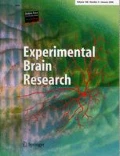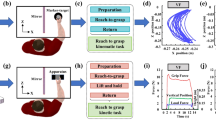Abstract
We examined how cerebellar deficits in isolated reaching or grasping movements contribute to abnormalities in a combined reach and grasp movement, and whether people with cerebellar damage show abnormalities in the spatiotemporal relationships of reach and grasp movements. We studied subjects with cerebellar damage and matched controls as they performed a combined reach and grasp, an isolated reach, and an isolated grasp. These movements were performed under slow-accurate and fast speed conditions. Subjects were also tested for their ability to correctly estimate the target size based on visual information. We measured the three-dimensional position of the index finger, thumb and wrist joint during all tasks. Results showed that cerebellar subjects overestimated the target size to a greater extent than did controls. During movement testing, cerebellar subjects were impaired on isolated reach and isolated grasp. However, they did not worsen parameters of reach or grasp movements during the combined reach and grasp. Instead there were distinct deficits in the coupling of the reach and grasp movement. Compared with controls, cerebellar subjects showed abnormalities in the sequence of the reach and grasp movement and highly variable timing of peak grip aperture. In the slow-accurate condition, cerebellar subjects decomposed the reach and grasp movement into separate reach then grasp components, and produced multiple peaks in grip aperture. In the fast condition, cerebellar subjects did not decompose, produced a single peak grip aperture, and dropped the target more often. These results indicate that cerebellar damage can cause a specific breakdown in the coupling of reach and grasp movements. The cerebellum may be involved in combining reach and grasp movements into a single motor program.
Similar content being viewed by others
Author information
Authors and Affiliations
Corresponding author
Rights and permissions
About this article
Cite this article
Zackowski, K.M., Thach, W.T. & Bastian, A.J. Cerebellar subjects show impaired coupling of reach and grasp movements. Exp Brain Res 146, 511–522 (2002). https://doi.org/10.1007/s00221-002-1191-9
Received:
Accepted:
Published:
Issue Date:
DOI: https://doi.org/10.1007/s00221-002-1191-9




